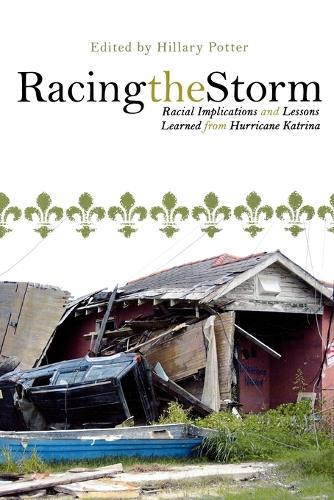
Racing the Storm: Racial Implications and Lessons Learned from Hurricane Katrina
(Paperback)
Publishing Details
Racing the Storm: Racial Implications and Lessons Learned from Hurricane Katrina
By (Author) Hillary Potter
Contributions by Terri Adams-Fuller
Contributions by Meera Adya
Contributions by Duke Austin
Contributions by Angela P. Cole
Contributions by O Jackson Cole
Contributions by Allison Cotton
Contributions by Brian J. Gerber
Contributions by Angela Glymph
Contributions by Arie Kruglanski
Bloomsbury Publishing PLC
Lexington Books
31st July 2007
United States
Classifications
Tertiary Education
Non Fiction
Ethnic studies / Ethnicity
Social impact of disasters / accidents (natural or man-made)
Racism and racial discrimination / Anti-racism
305.800973
Physical Properties
Paperback
320
Width 154mm, Height 229mm, Spine 24mm
485g
Description
On August 29, 2005, Hurricane Katrina hit land and gravely affected the lives of many people in the states along the Gulf Coast. Katrina went beyond demonstrating the devastating natural effects of a hurricane by exposing the continuing significance of race relations and racial stereotyping in U.S. society.Racing the Storm serves to highlight the race-based perceptions of and responses to Katrina survivors by governmental entities, volunteers, the media, and the general public. Scholars from a variety of disciplines take on the task of analyzing the social phenomena and racial implications surrounding Hurricane Katrina.
Reviews
Racing the Storm uses race as a way to study it[Hurrican Katrina]. Highly recommended. -- . * Choice Reviews *
This book highlights the race-based perceptions of and responses to Katrina survivors by governmental entities, volunteers, the media, and the general public. Scholars from a variety of disciplines take on the task of analyzing the social phenomena and racial implications surrounding Hurricane Katrina. -- . * Natural Hazards Observer *
Racing the Storm: Racial Implications and Lessons Learned from Hurricane Katrina is a wide ranging exploration of the many phases of the catastrophe, from social psychological statistical analysis of social identity and attributions explanations of race-based perceptions, the meaning of crime and looting from the perspectives of Black and minority people, the history and emerging racialization of Latino immigrants in New Orleands, to an intriguing comparison of Katrina and the human suffering caused by the war in Iraq. I strongly recommend it. -- B. E. Aguirre, Disaster Research Center, University of Delaware
Author Bio
Hillary Potter, PhD, is assistant professor of Sociology at the University of Colorado at Boulder.
